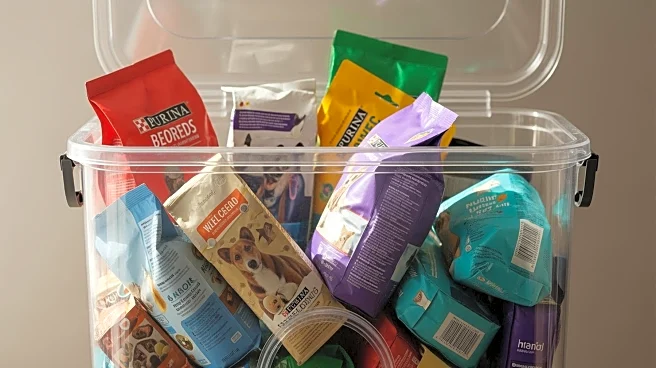What's Happening?
Recent reports have surfaced regarding the disposal of Purina pet foods at a location not affiliated with its manufacturing facilities. Images shared on social media show multiple dumpsters filled with large bags of Purina One pet food in Franklin Park,
Illinois. The disposal site is linked to Nestle's Vital Proteins facility, although Purina does not have a manufacturing plant in the area. The pet foods, which are not expired, have raised questions about whether Purina PetCare is concealing issues or if there is a benign explanation. Federal law mandates pet food manufacturers to report any problems to the FDA within 24 hours, classifying such issues as 'reportable food' concerns.
Why It's Important?
The disposal of pet food at a non-manufacturing site raises significant concerns about transparency and consumer trust in pet food safety. If Purina is disposing of pet food outside its facilities, it could indicate potential issues with product quality or safety that have not been disclosed. This situation underscores the importance of regulatory compliance and consumer protection in the pet food industry. The incident may affect consumer confidence in Purina and prompt scrutiny from regulatory bodies like the FDA, impacting the company's reputation and sales.
What's Next?
Further investigation is likely to determine the reasons behind the disposal and whether Purina adhered to federal reporting requirements. Stakeholders, including pet owners and consumer advocacy groups, may demand more transparency and accountability from Purina. Regulatory authorities could initiate inquiries to ensure compliance with safety standards. The outcome of these investigations could influence industry practices and lead to stricter regulations on pet food disposal and reporting.
Beyond the Headlines
This incident highlights broader issues in the pet food industry, such as the need for improved transparency and consumer education regarding product safety. It may prompt discussions on ethical practices in manufacturing and disposal, as well as the role of social media in uncovering potential industry malpractices. Long-term, this could lead to increased consumer advocacy and pressure for regulatory reforms.
















